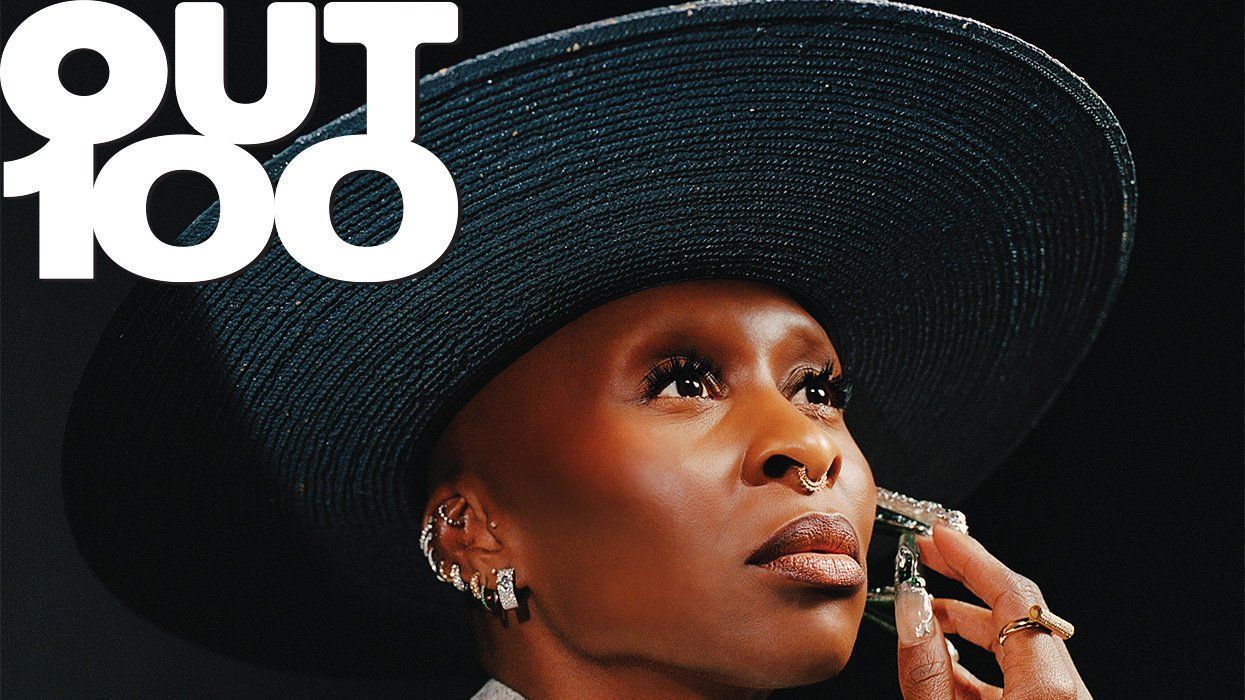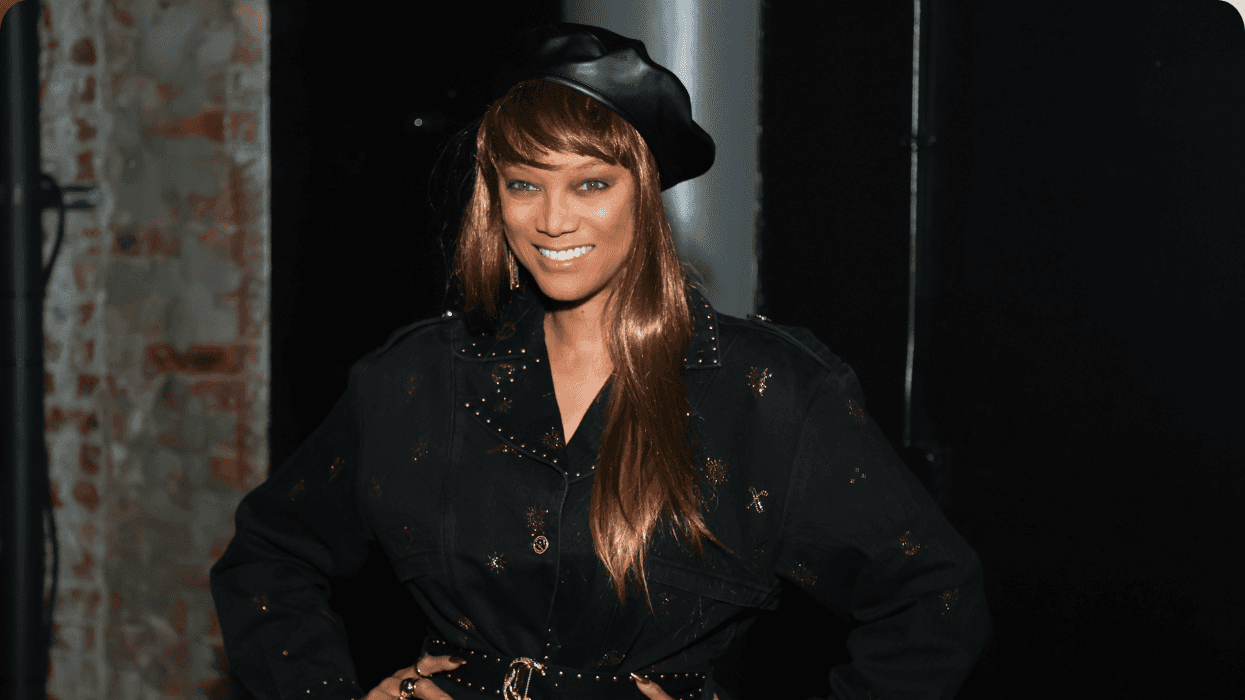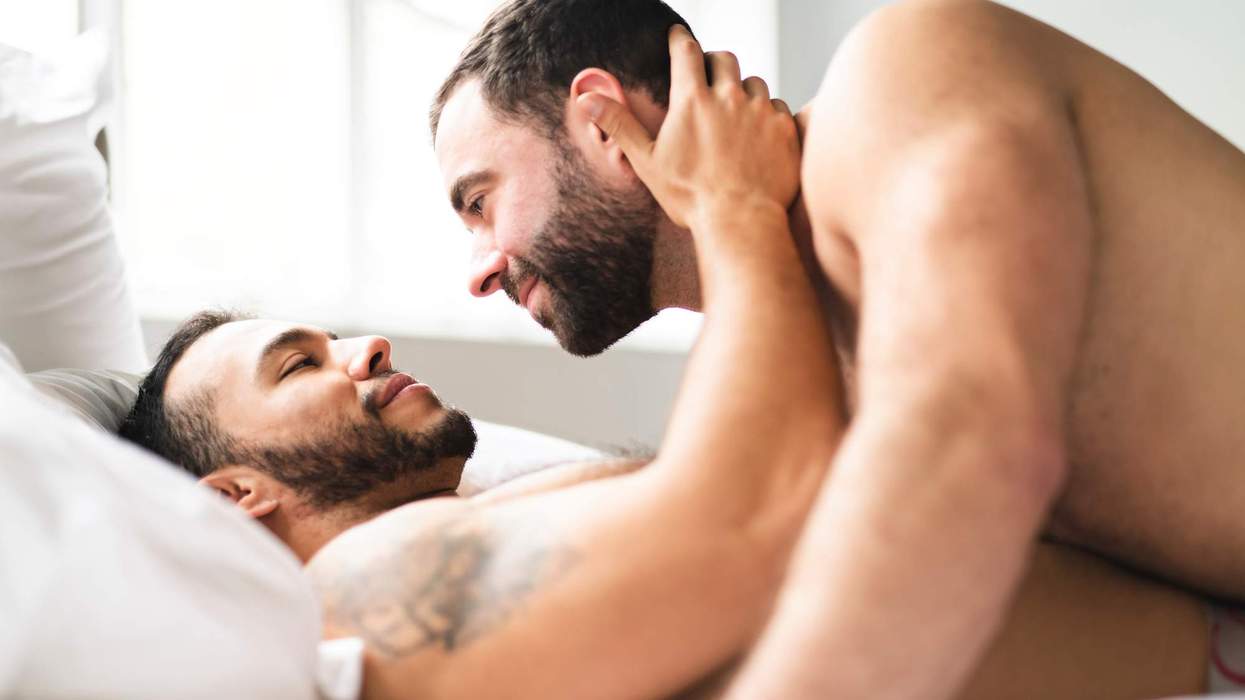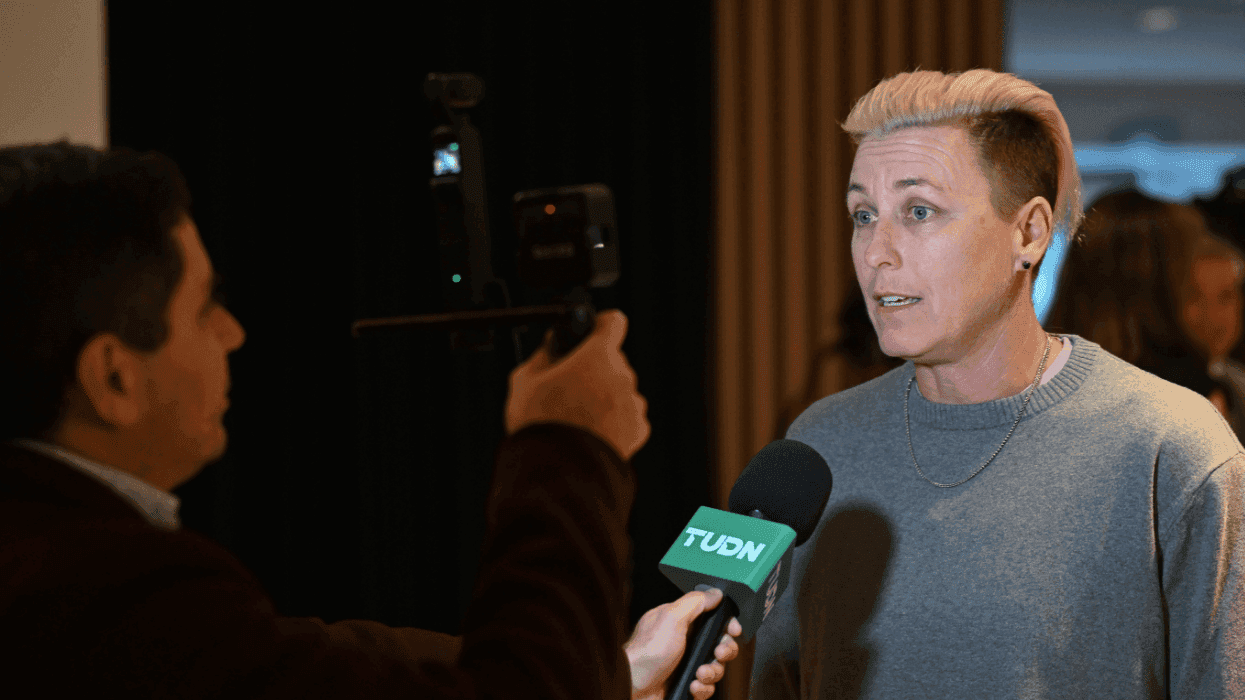There’s a 1963 photo of James Baldwin and Lorraine Hansberry dancing. Baldwin’s arms stretch to his wingspan, his head playfully cocked to the side. Hansberry glances over her shoulder toward him, cradling a cigarette. It’s a moment of communion between revelatory Black queer artists.
More than 60 years later, Emmy, Grammy, and Tony winner Cynthia Erivo poses for her Out cover shoot in Los Angeles just three months from the release of the wildly anticipated big-screen adaptation of the musical Wicked, in which she stars as the misunderstood, viridescent Elphaba. She balances a cigarette between her fingers. In other pictures, she leans into her physical prowess, performing a headstand or standing on one leg. Throughout, she holds the Another Country author and A Raisin in the Sun playwright close at heart.
“A lot of our Black queer icons don’t necessarily get the fanfare often, and I thought that it would be a really wonderful opportunity to pay homage to these wonderful minds and, actually, really stylish people,” Erivo says.
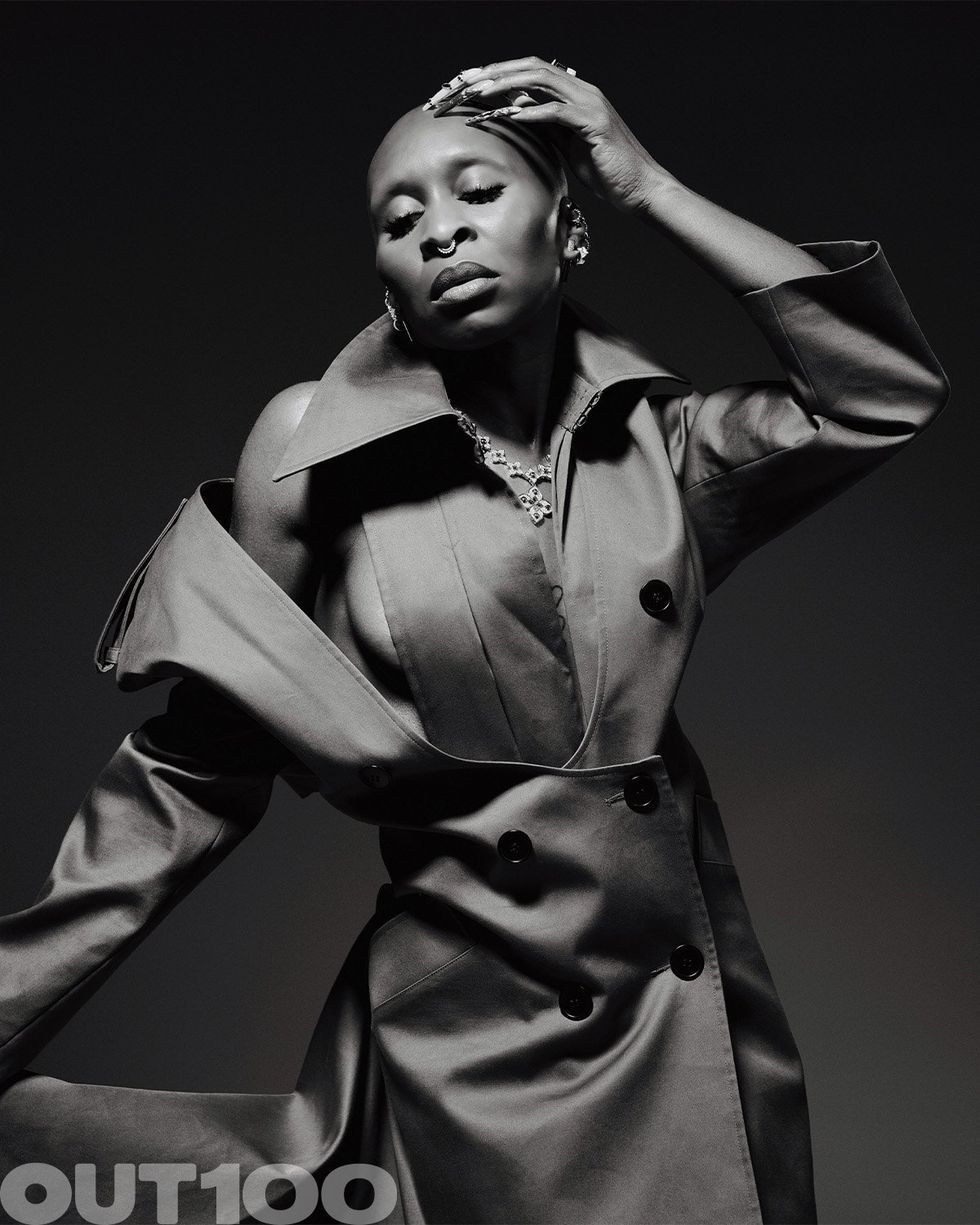
Erivo is on her own path to greatness. A graduate of the Royal Academy of Dramatic Art in London where she grew up, she is renowned for playing Celie in The Color Purple on Broadway (2015), abolitionist Harriet Tubman in Harriet (2019), and Aretha Franklin in the Nat Geo series Genius: Aretha (2021). And she’s been a mainstay at the Kennedy Center Honors, delivering breathtaking musical tributes to Dionne Warwick and Earth, Wind, and Fire. Now in her leading role in what could be the year’s biggest box-office smash, Erivo stands fully in her intersections as a Black queer woman. That legacy is why she honored Hansberry and Baldwin.
“They’re a direct line to me. And [Hansberry] being one of the first Black women to write a play and have a play on Broadway — those two people are seminal in my growth and my upbringing in the arts,” she shares.
For two years, Erivo embodied Celie, the heroine from Alice Walker’s 1982 novel The Color Purple, and one of a handful of leading Black queer characters in musical theater. Accepting the Tony Award for the role in 2016, she called Walker’s text a “story that can last through time and time again.” For eight shows a week — including one storied day when she ran the Brooklyn Half Marathon before a matinee — she brought down the house with “I’m Here,” in which Celie comes into her own: “I’m beautiful / Yes, I’m beautiful / And I’m here.”
Cut to her Elphaba, proclaiming, “Unlimited / My future is unlimited” in “The Wizard and I.” The song arrives early in the film, and in it, Elphaba dreams of stepping into her full power at Shiz University, where the school’s head, Madame Morrible (Michelle Yeoh), recognizes her magical potential. Under the direction of Jon M. Chu (Crazy Rich Asians and In the Heights), the number teems with boundless hope for Elphaba whose father denounced her at birth upon seeing her green skin, the start of a lifetime of othering.
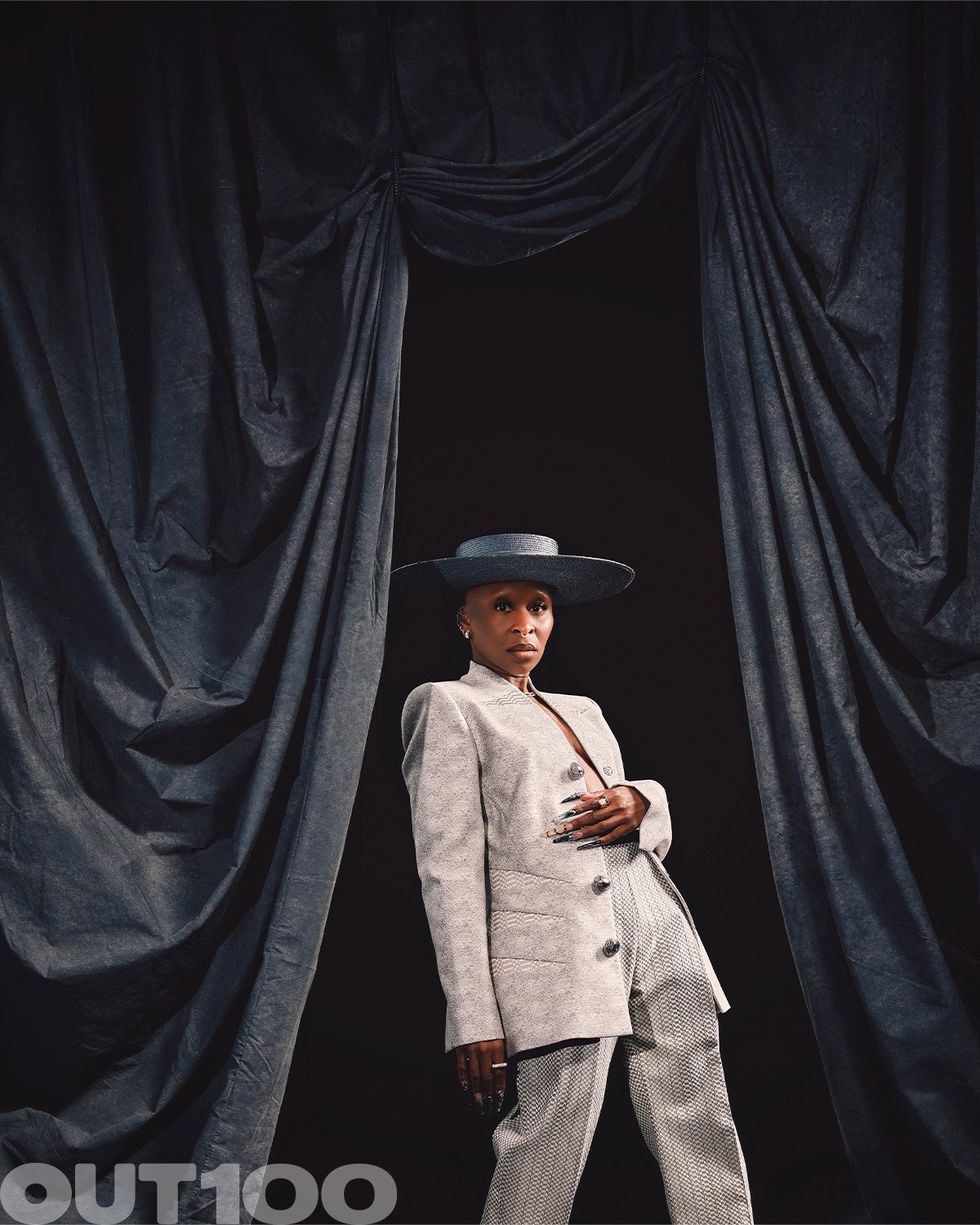
There’s layered source material for Elphaba. Dozens of Broadway superstars have played her in Stephen Schwartz’s musical based on Gregory Maguire’s 1995 novel, with Idina Menzel originating the role in 2003. Oz lore begins in 1900 with L. Frank Baum’s The Wonderful Wizard of Oz and subsequent books. Then came the beloved 1939 Judy Garland-led film with Margaret Hamilton as Wicked Witch of the West — the witch Elphaba grows into. (A central theme of Wicked explores if people are born wicked or made so by the wickedness of others.)
“I can't even remember what age it was, but I was pretty young when I first saw The Wizard of Oz, and I hear a lot of people had gotten scared of the Flying Monkeys. Maybe that was a sort of foreshadowing,” Erivo says. The ’70s brought The Wiz to Broadway with an all-Black cast. In 1978 Diana Ross and Michael Jackson starred in the movie version with Mabel King playing Evillene, The Wiz’s version of the Wicked Witch of the West. That rendition introduced Erivo to the idea that “you could take this world of Oz and reimagine it in this way.” Still, Erivo’s most essential acting tool derives from lived experience.
“It's hard to talk about Elphaba as an other without having it intrinsically linked to being a woman who walks through the world as a queer Black woman. Immediately I understood what it meant for people to look at you and see you as not beautiful, not acceptable, not any of those things, because I walked through the world like this,” Erivo says. “And having to find a way to not necessarily be OK with it but be OK with yourself enough so that when other people put that on you, you can still move through it.”
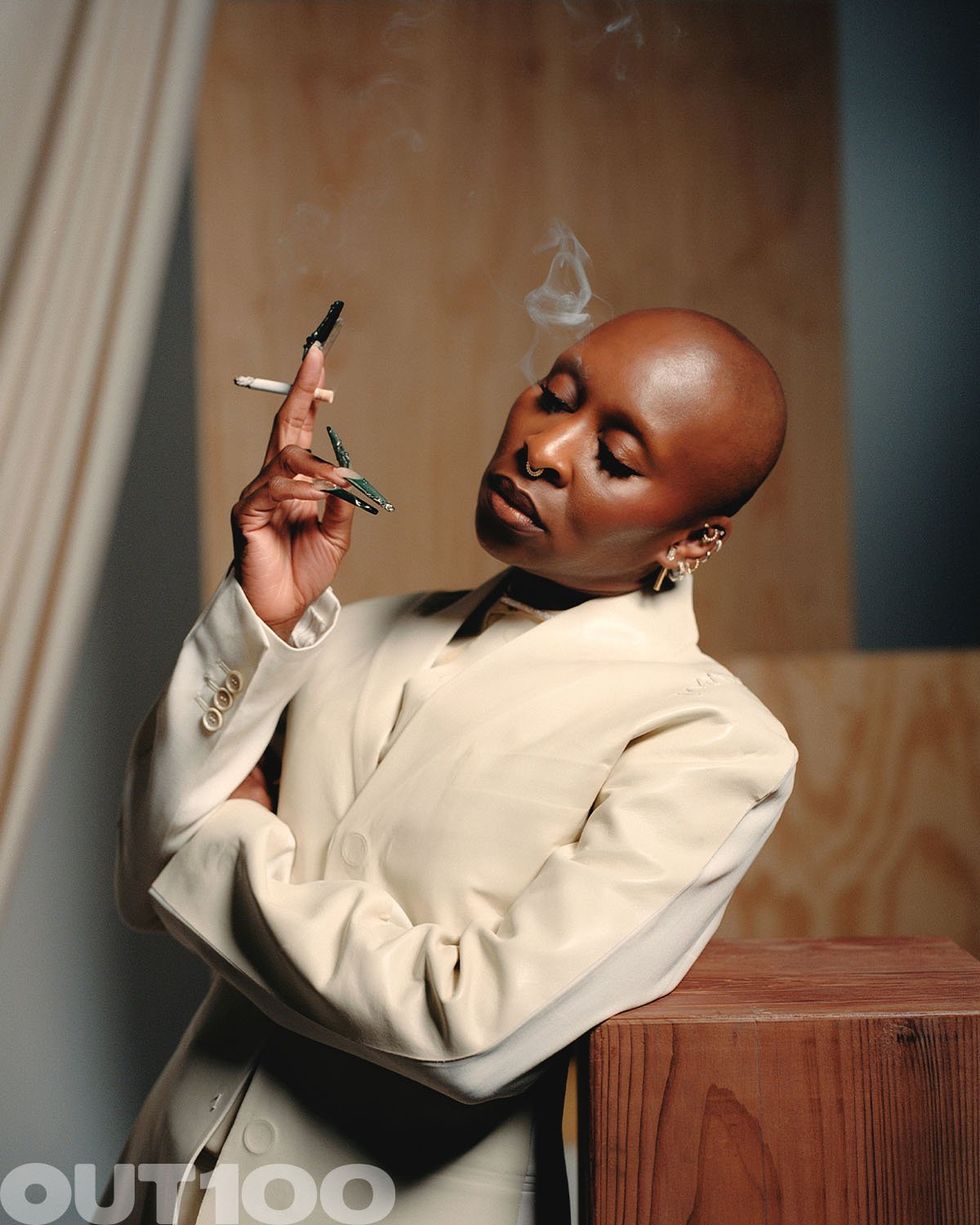
Erivo recently made major strides down the Yellow Brick Road. The Human Rights Campaign honored her in September with its National Equality Award for a second time. The first was in 2019. “Back then, when I received this award, I received it as an ally. And this time, I get to stand here and receive it as an out and proud member of the LGBTQIA+ community,” Erivo said in her speech, sharing that she wasn’t sure she could land work in entertainment at the intersections of her full identity.
“I had to claim the beauty of my queerness,” said Erivo, who previously did so in British Vogue’s 2022 Pride issue.
Claiming identity is part of Elphaba’s story too. In one scene, the young witch arrives at Shiz only to drop off her younger sister, Nessarose (Marissa Bode), who uses a wheelchair. Elphaba becomes protective of Nessa, and she inadvertently lets her magic fly. This act leads to her enrollment and meeting Glinda (Ariana Grande) and The Wizard (Jeff Goldblum).
“Her power doesn’t just lie in the fact that she’s different. Her power lies in having to learn how to use her emotion. She’s had to keep a lid on things. She’s had to keep a lid on her rage, and she’s had to keep a lid on her joy. She's had to keep a lid on her sadness,” Erivo says. “There is power in the experience that she’s had in her life and the emotions that she’s gained from them.”
Tamping down to make others comfortable resonates with Erivo. “I’ve experienced it.… ‘You’re a bit too intimidating when you come in the room. Be a little bit quieter or don’t dress like that or don’t wear that,’” she says. “But there’s such power in being all of who you are, in accepting all of your emotions.… I just deeply understood what that means.”
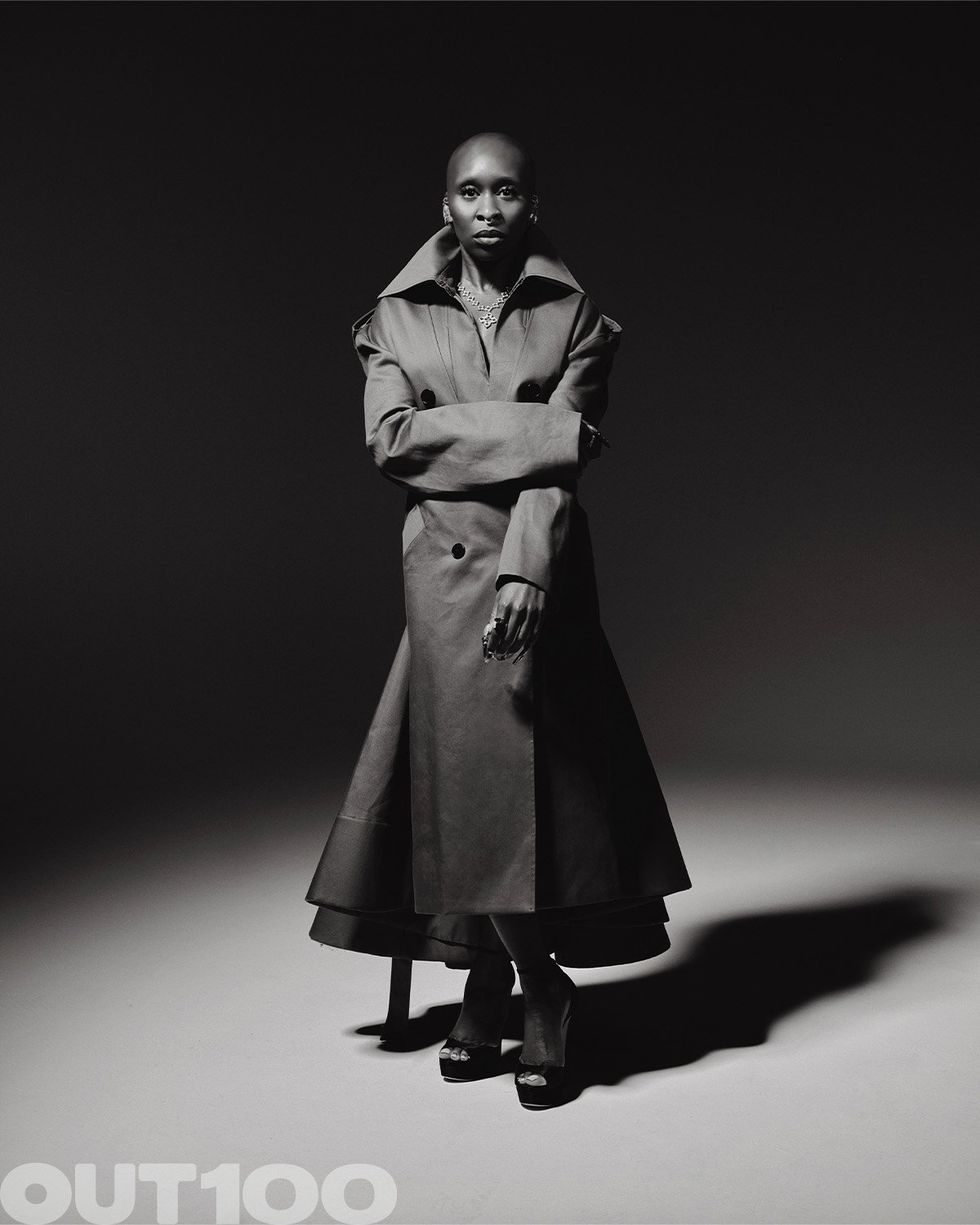
Wicked inspired Erivo more than a decade before her casting. On her 25th birthday, the now-37-year-old took herself on a date to see the show in London’s West End. “I remember it was rainy that night, but I just remember falling in love with this musical and this music,” Erivo recalls. “And when I went home...I just felt really alive.”
The Land of Oz has been a queer-friendly place since Garland slipped into Dorothy’s ruby slippers and the term “friend of Dorothy” became code for LGBTQ+ people. But this Wicked is packed with several gifted queer actors, including Bode as Nessarose, Jonathan Bailey as the dashing Fiyero, Bowen Yang as Pfannee, and Bronwyn James as ShenShen.
“Because of how many differences each of us holds within ourselves as people and how many differences our characters hold, [the film] intrinsically wants to be a queer canon,” Erivo says. “It intrinsically is about the difference of people, the acceptance of people that are different, whether it is walk of life or the color of one’s skin or the power a person holds that might be different to your own.”
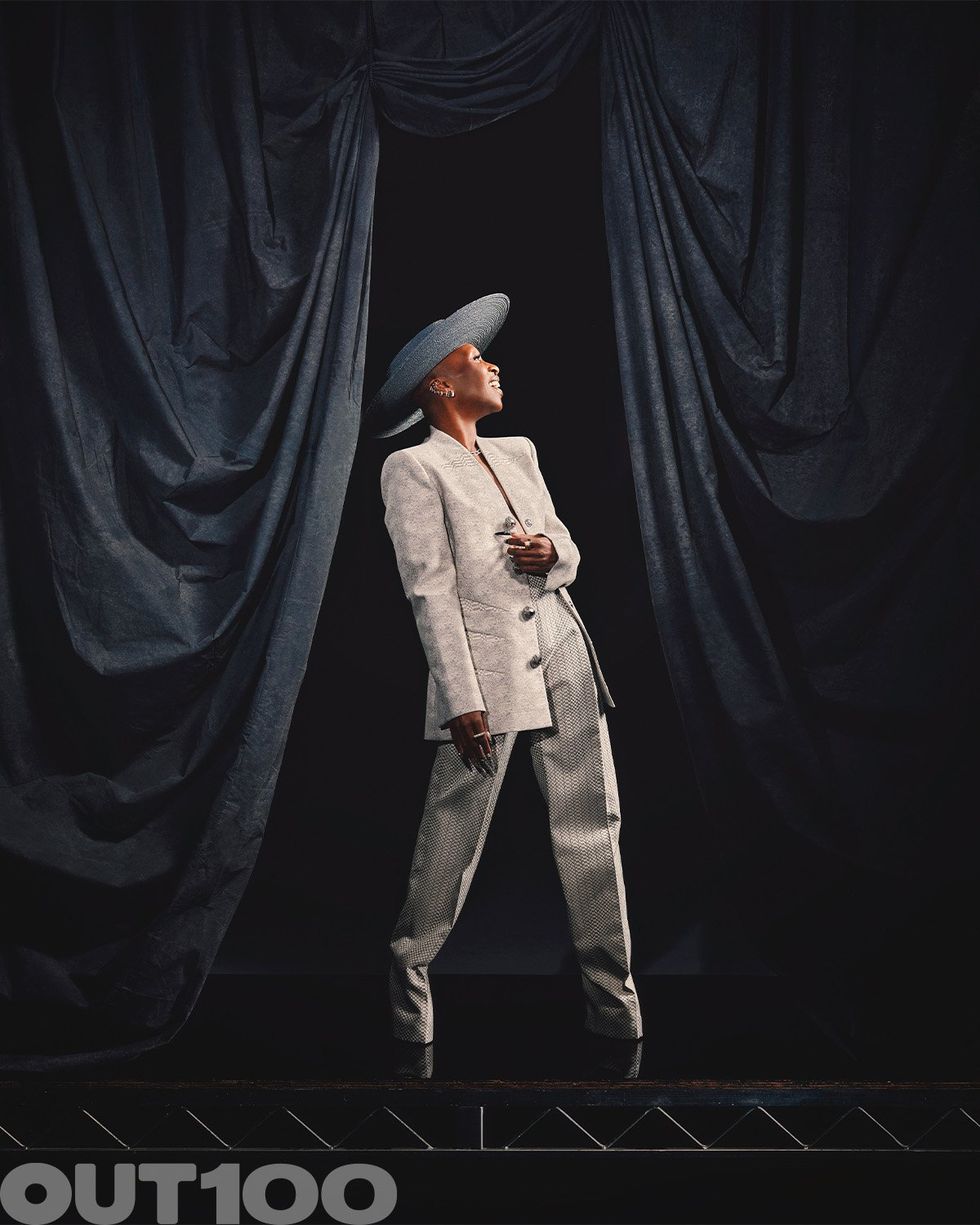
That sense of queer community showed up on set in a pivotal scene. Shiz students shun Elphaba in the Ozdust ballroom over the hat Glinda tricks her into wearing, and Elphaba steps into the light and dances on her own.
“Something beautiful [was] happening on set because even a lot of our dancers and background artists are also queer. That moment in the Ozdust, even though it’s a moment of real loneliness, there’s something really wonderful that was happening in that every single person in that room could understand that loneliness,” she says. “What I was receiving was like a force field of absolute support and love, and it was really overwhelming.”
The scene is also meaningful because it’s where Elphaba’s rival Glinda steps up to dance with her. It’s the beginning of an abiding friendship that unfolds on-screen and through songs from “Popular” to “For Good” (although audiences must wait for Wicked: Part Two to see that tear-jerking friendship ode).
Erivo and Grande “understood each other and the journeys that we were going on; the conversations that we had were really just true, open, honest conversations,” Erivo says. “I know for a fact that she understands [what] it feels like just to be isolated and to be alone and to feel that way and to feel like sometimes when you can try and try and try that you’re coming up against the brick wall.”
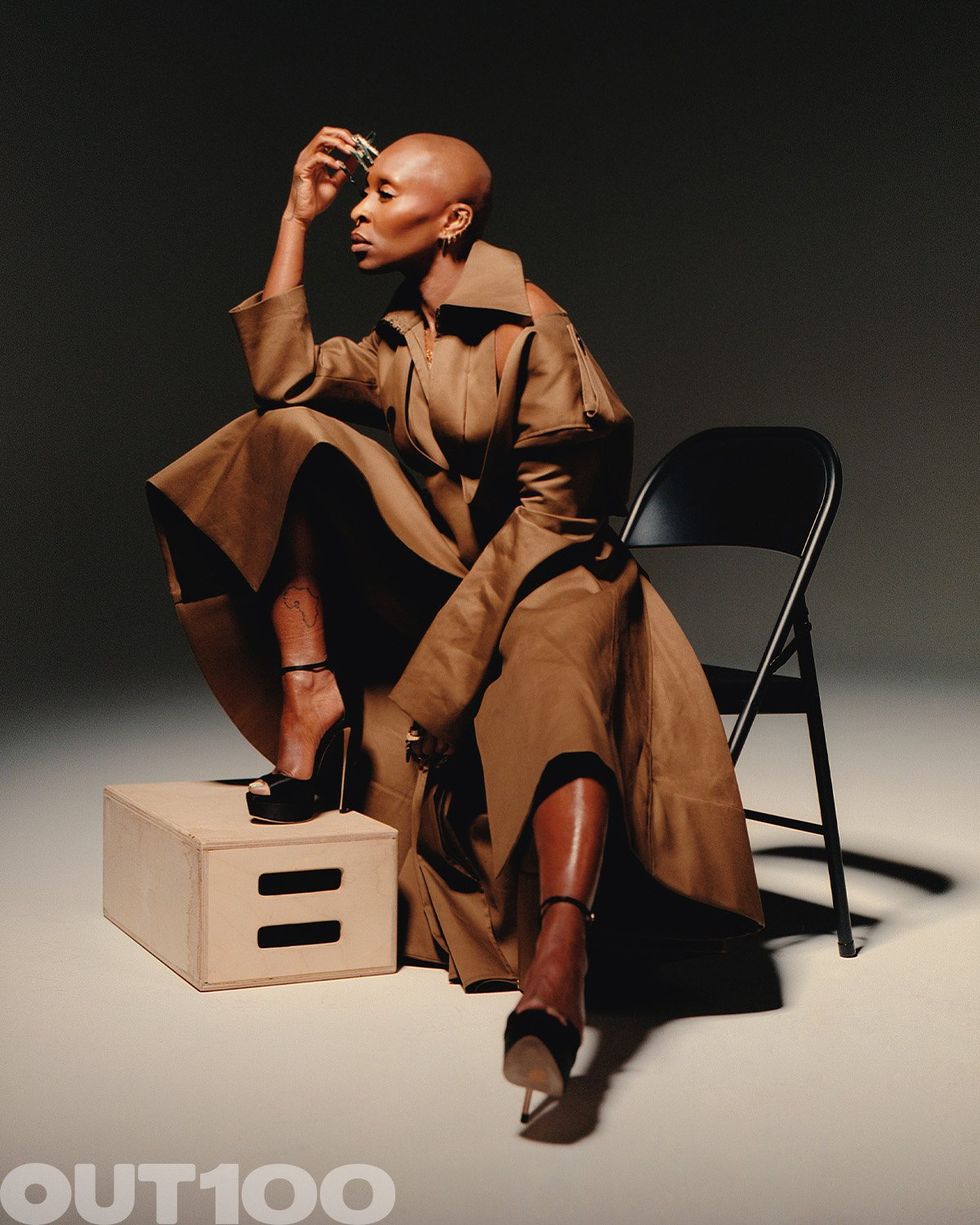
Though Fiyero is a romantic interest, the real love story is between the women following their initial rivalry, which Erivo says is “interesting because I’m not sure it is a competition.”
“Both of them come from a place of insecurity. Glinda, yes, has privilege. She has been taught that her value is only to do with what she looks like and who she dates and the clothes she wears. For the first time with [Elphaba], it’s someone who sees her for more than all of those things.” Likewise, Elphaba sees herself through Glinda toward the end of “Popular” when the princess of pink’s attempts at a full Elphaba makeover result in Glinda placing a simple pink poppy in the green woman’s hair.
“They fall in love with the person, not just the outside. When Glinda puts that flower in her hair and realizes that all she needs is this tiny thing that goes ‘good with green,’ it is not just Oh, look, she has a flower in her hair. It’s actually...I see you as beautiful as you are.”
“The story of these two is really, really special. And I think that we underestimate the power of platonic love, true friendship, true love,” Erivo adds.
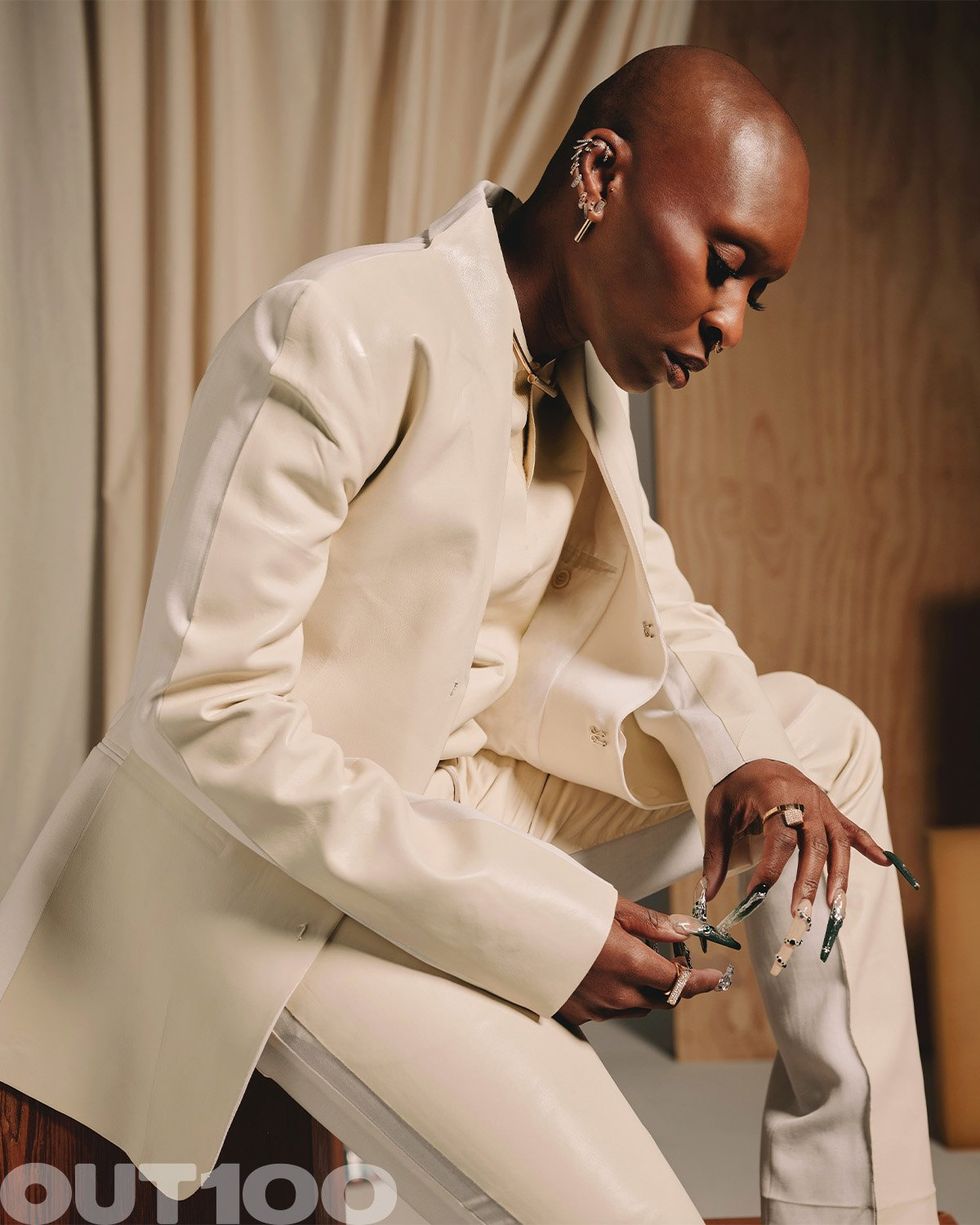
Erivo’s artistic endeavors stretch beyond musical theater. In 2021 she released an album, Ch. 1 Vs. 1, and the single “The Good,” about a painful breakup that features Erivo as half of a queer couple in the video.
“People don’t realize that music for me is really expansive. So it is not just musical theater, it is recording, it is live performance with orchestras,” she says. “I hope that the space is open for that because I think we sometimes minimize people who perform musical theater to just musical theater, but actually some of us have so much more to give.”
Erivo also launched her production company, Edith’s Daughter, in 2020. Last year, she produced the film Drift, in which she plays a Liberian refugee. Next up, she’s producing and starring in Prima Facie, a film adaptation of a one-woman play that delves into sexual assault.
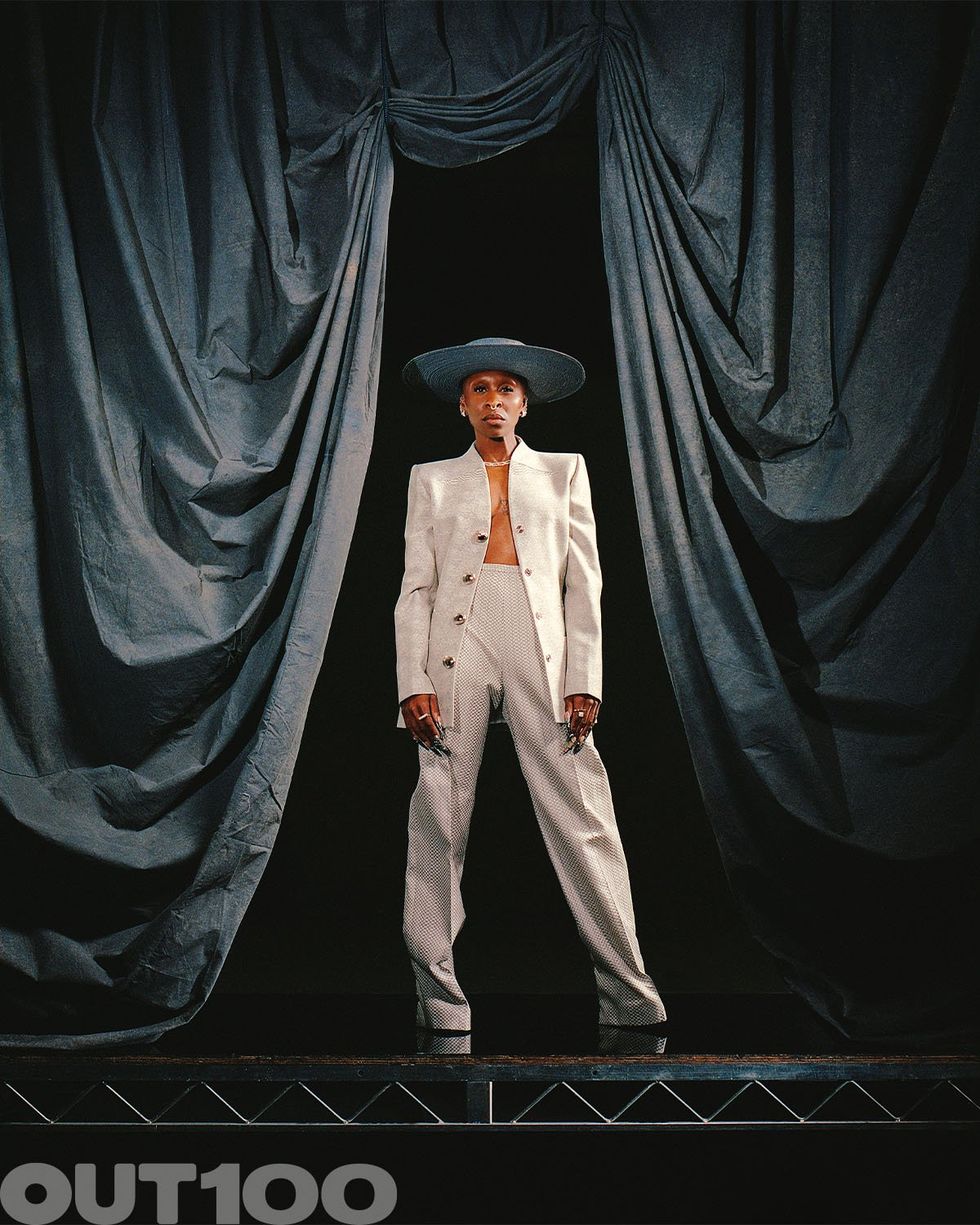
Though Wicked has yet to be released, Erivo has already felt the power of her presence in the film. “It’s just like a seismic moment for me. People haven’t seen it yet, and I’m still getting young Black girls messaging me about the braids in their hair and the nails that they see, and they never saw themselves as an Elphaba or felt like an Elphaba. To be able to just open the door a little wider for everyone feels really special,” Erivo shares.
“I would be lying if I said that I always thought this was possible. I didn’t because besides it being this particular character, it’s this property, the law of Oz, this world. It is a big dream to have, and it’s a big dream to have and not realize that you had it in the first place. So to realize that — it’s a big deal.”
This cover story is part of the Out November/December issue, which hits newsstands on October 29. Support queer media and subscribe — or download the issue through Apple News, Zinio, Nook, or PressReader starting October 17.
The full Out100 list goes live on Thursday, October 17 at 7am PT/10am ET!
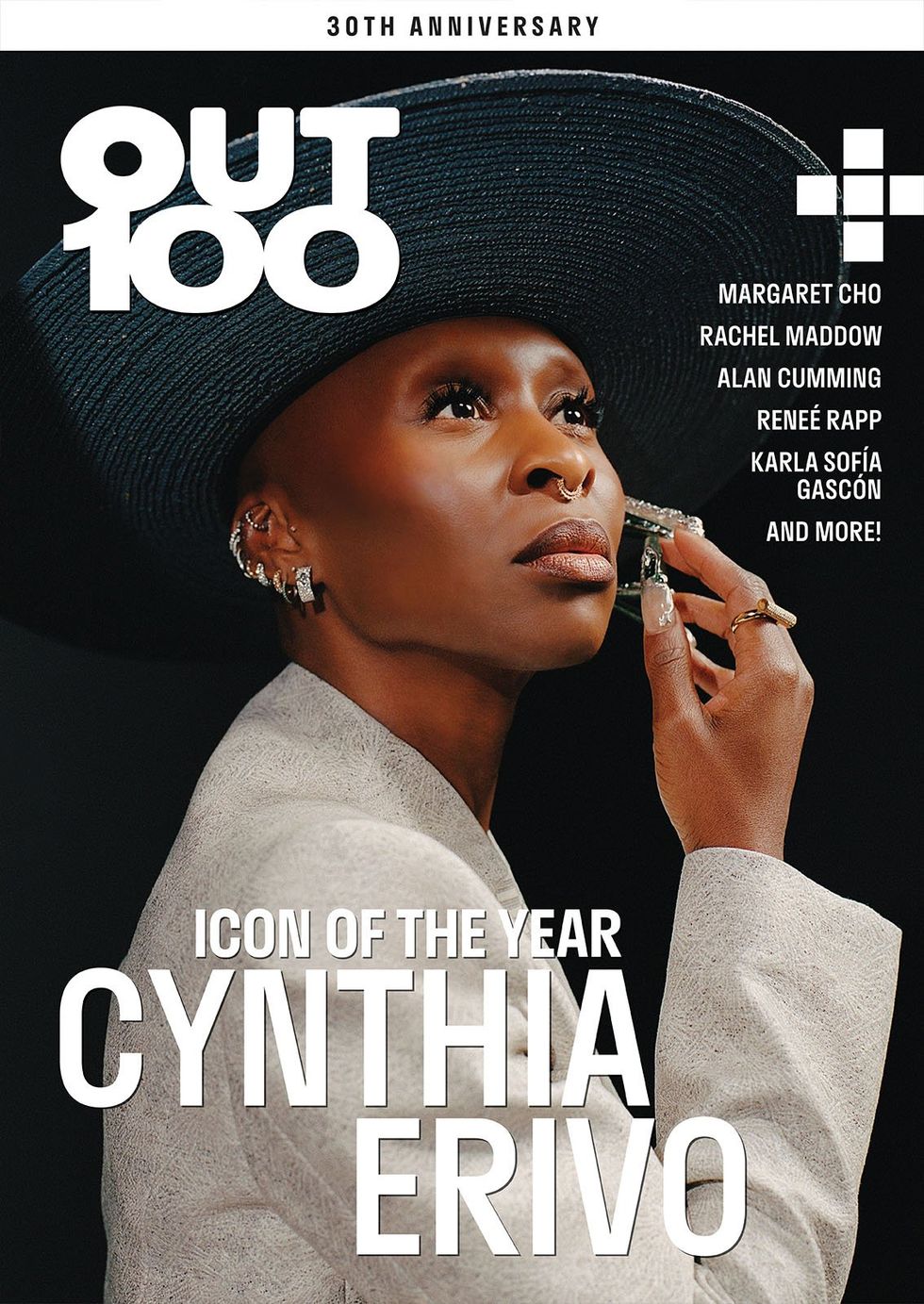
talent: CYNTHIA ERIVO @cynthiaerivo
photographer: ERIK CARTER @erik_carter with ANDERSON HOPKINS @andersonhopkins
digital tech: JOSEPH MITCHELL #joemitchell
first assistant: NICOL BIESEK @nicolb.jpg
second assistant: SCOTT TURNER @switttch_
set stylist: GABRIELA COBAR @gabriela_cobar
set assistant: A.J. BUCKNALL
stylist: JASON BOLDEN @jasonbolden at JSN STUDIO @jsn.studio
stylist assistant: JOHN MUMBLO @johnmumblo
grooming: JOANNA SIMKIN @joannasimkin at THE WALL GROUP @thewallgroup
videographer: MIGUEL TORRES
location: INTERWOVEN STUDIOS @interwoven_studios



